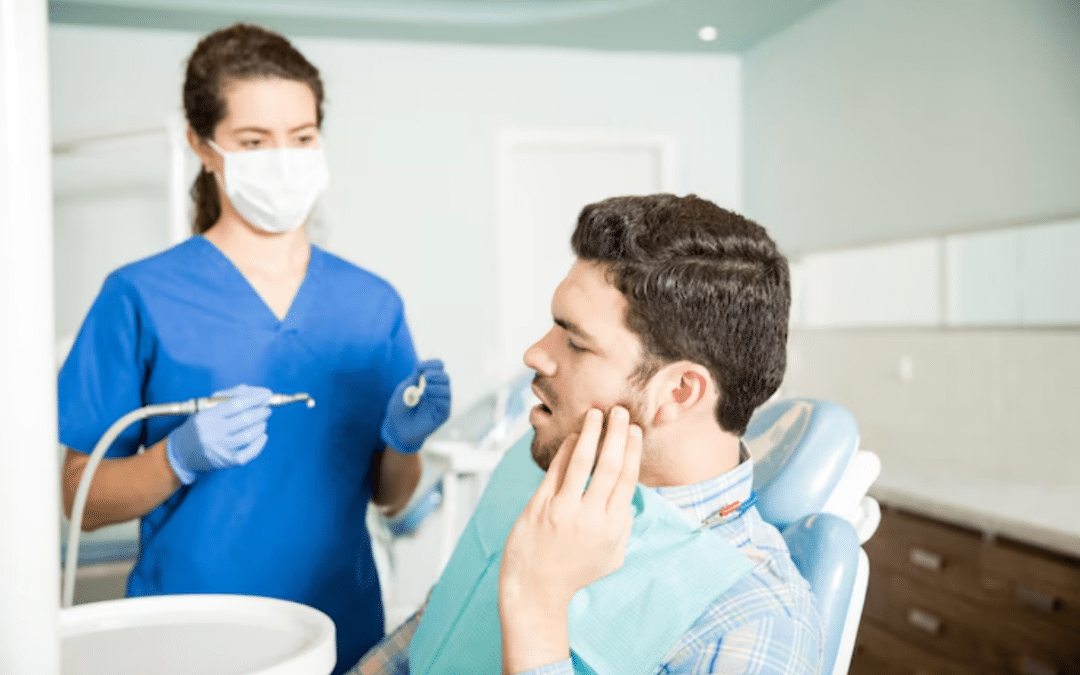Even the most basic actions may become intolerable due to the severe, throbbing agony that tooth abscesses can produce. Even while getting competent dental care as soon as possible is important, there are situations in which you require relief right away before visiting an emergency dentist.
In this blog, we will discuss practical, short-term ways to lessen the pain and discomfort of an abscessed tooth, giving you much-needed comfort while you wait for medical attention.
What Should You Know About Tooth Abscess Pain?
Before discussing pain relief, it’s essential to understand what a tooth abscess is. It occurs when bacteria infect the root or surrounding tissue of a tooth. Symptoms include severe toothache, sensitivity to hot and cold, swelling of the gums or face, and bad breath.
Tooth Abscess Signs And Symptoms
Here are the common indicators that you might have a tooth abscess:
- Severe, Throbbing Pain: The most notable symptom of a tooth abscess is severe, continuous, and throbbing pain in the vicinity of the injured tooth or tooth. The pain can radiate to the jaw, neck, or ear on the same side as the infected tooth.
- Sensitivity to Hot and Cold: An abscessed tooth often becomes extremely sensitive to hot and cold temperatures. Eating or sipping on anything hot or cold can trigger sharp, intense pain.
- Swelling: Swelling in the face, cheek, or neck is a common sign of a tooth abscess. The swollen area may feel tender and warm to the touch.
- Red, Swollen Gums: The gums around the affected tooth may become red, swollen, and tender. There might be visible pus or a pimple-like bump on the gums, which is known as a gum boil or parulis.
- Bad Taste or Odor: If the abscess ruptures, you might experience a sudden rush of foul-tasting and foul-smelling fluid in your mouth. This can temporarily relieve pain but requires immediate dental attention.
- Difficulty Chewing or Biting: The pain and swelling associated with a tooth abscess makes it difficult to bite down on or chew the afflicted side. This may cause one’s eating habits to alter certain foods.
- Fever: A tooth abscess can cause a fever as your body is fighting off the infection. You may also experience chills or a general feeling of being unwell.
- Swollen Lymph Nodes: Lymph nodes in your neck or under your jaw may become swollen and tender to the touch. This is a sign that your body is responding to the infection.
- Difficulty Breathing or Swallowing: In severe cases, a dental abscess infection may spread, leading to difficulty breathing or swallowing. This is a serious matter that requires immediate medical attention.
Temporary Pain Relief Measures
When tooth abscess pain strikes, finding quick relief becomes essential while you wait for professional dental care. Although these methods won’t cure the infection, they can help ease the pain and discomfort temporarily. Here are some practical steps you can take to manage the pain until you can see an emergency dentist:
- Over-the-counter pain relievers: Nonsteroidal anti-inflammatory drugs (NSAIDs) can help reduce pain and inflammation. Adhere to the dosage specified on the product’s label.
- Cold compress: Pressing a cold compress on the infected area can help reduce swelling and temporarily numb the pain. Cover an ice pack with a flimsy cloth before applying it to your face.
- Saltwater rinse: Cleaning your mouth with warm salt water helps clean the area and reduce inflammation. Add 1 teaspoon of salt to a glass of warm water.
- Over-the-counter oral gels: Topical pain relievers like benzocaine can provide temporary relief. Apply the gel as directed on the product label.
- Avoid irritating foods: Stay away from hot, spicy, or acidic meals and beverages as much as they irritate the affected area.
- Elevate your head: Keeping your head elevated while resting can prevent blood from rushing to the affected area, which may help reduce pain.
- Maintain oral hygiene: Gently brush and floss around the affected area to keep the mouth as clean as possible without aggravating the abscess.
Important Considerations
- Do not place aspirin directly on the tooth: It can irritate the gums and cause further damage. Instead, take aspirin or any other pain reliever orally as directed on the packaging or by your healthcare provider.
- Avoid self-medication with antibiotics: Only take antibiotics prescribed by a dentist or doctor. They provide the appropriate medication and dosage tailored to your infection, ensuring safe and effective treatment.
- Monitor for worsening symptoms: If the pain intensifies, the swelling increases, or you develop a fever, seek immediate medical attention to prevent serious complications, such as the infection spreading to other parts of the body.
When To Take an Emergency Dentist’s Help Regarding This?
While home remedies can help manage discomfort, it’s essential to seek professional treatment for a tooth abscess. An emergency dentist is qualified to identify the infection’s underlying cause and administer the necessary care, including draining the abscess, root canal therapy, or antibiotic prescription.
In general, a dental abscess is a dangerous condition that requires prompt attention. Although home remedies may offer momentary alleviation, they cannot replace expert dental treatment. If you notice you have a tooth abscess, contact an emergency dentist immediately. Early cures can prevent the infection from spreading and causing more severe complications.
Remember, this information is intended for general knowledge and doesn’t replace professional dental advice. Always consult with a qualified professional for any dental concerns.

